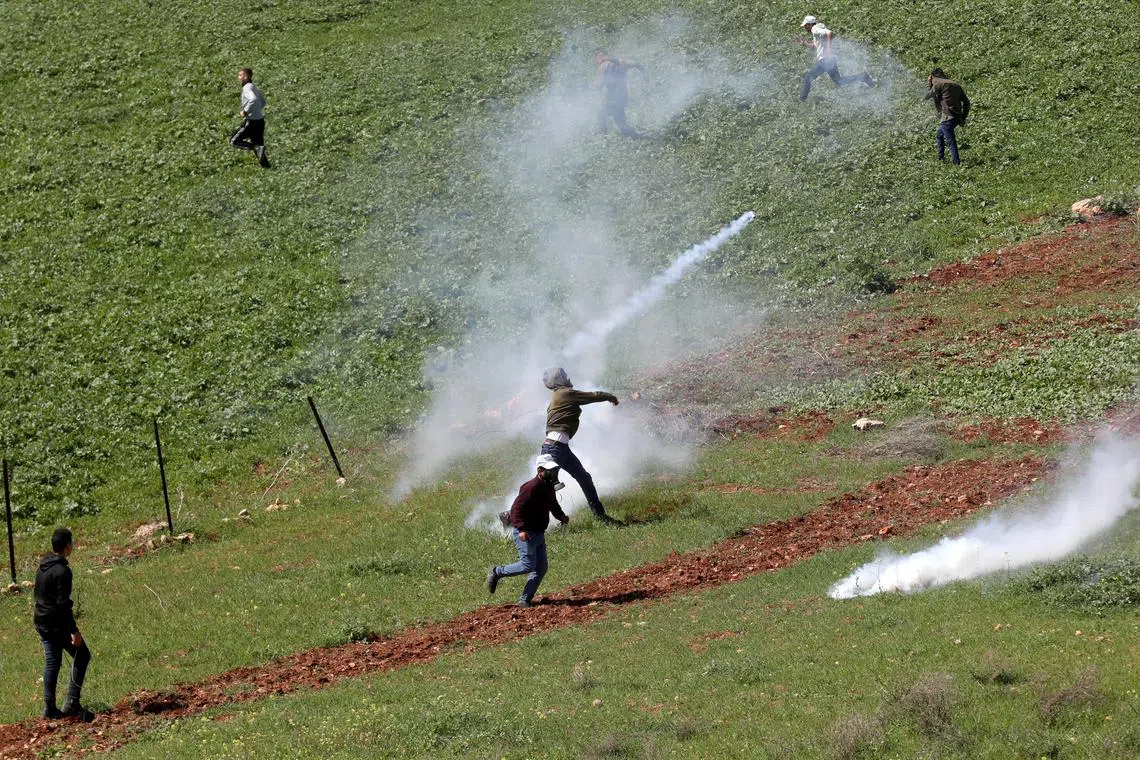Israeli and Palestinian officials meet in pre-Ramadan push for calm
Sign up now: Get ST's newsletters delivered to your inbox

The Israeli-occupied West Bank has seen a surge of confrontations in recent months.
PHOTO: EPA-EFE
CAIRO - Israeli and Palestinian officials met on Sunday in Egypt for talks aimed at preventing already surging violence from escalating even further when the Muslim holy month of Ramadan begins later this week.
Sunday’s meeting in the resort city of Sharm el-Sheikh “aims to support dialogue between the Palestinian and Israeli sides to work to stop unilateral actions and escalation, and break the existing cycle of violence and achieve calm”, a statement from Egypt’s foreign ministry said.
A reduction in violence could “facilitate the creation of a climate suitable for the resumption of the peace process”, it added.
The meeting was also backed by the United States and Jordan.
It follows a Feb 26 US-brokered conference in the Jordanian coastal city of Aqaba, the first of its kind in years, which failed to halt violence on the ground despite Israeli and Palestinian pledges to de-escalate.
Over the past year, Israeli forces have made thousands of arrests in the West Bank and killed more than 200 Palestinians, including fighters and civilians, while more than 40 Israelis and three Ukrainians have died in Palestinian attacks.
The Israeli-occupied West Bank has seen a surge of confrontations in recent months,
In previous years, Ramadan has occasionally seen clashes between Israeli police and Palestinians, particularly around Jerusalem’s Al Aqsa mosque
Ramadan coincides this year with Judaism’s Passover and Christian Easter.
Egypt and Jordan were pushing ahead of Sunday’s meeting to secure commitments including Israeli restraint during Ramadan around the compound, and the release of Palestinian prisoners, in return for a reduction in Palestinian attacks, according to an Egyptian security source speaking on condition of anonymity.
Palestinian militant group Hamas, which governs the Gaza Strip, condemned the West Bank-based Palestinian Authority for taking part in the meeting, noting it was being attended by the Israeli government “which is escalating its aggression against our people”.
Mr Hussein Al-Sheikh of the umbrella Palestine Liberation Organisation said a Palestinian delegation would be in Sharm el-Sheikh “to defend the rights of our Palestinian people to freedom and independence, and to demand an end to this continuous Israeli aggression against us”.
Netanyahu’s office declined comment on the Sharm el-Sheikh meeting.
Last month’s Aqaba talks, praised by the United States as a “historic gathering”, were immediately overshadowed when Jewish settlers went on the rampage in the Palestinian village of Huwara, setting Palestinian homes ablaze after a deadly Palestinian gun ambush.
The Palestinians aim to establish an independent state in the West Bank and Gaza Strip with East Jerusalem as its capital – territories Israel captured in a 1967 war.
Peace talks have been stalled since 2014 and Palestinians say Israel has undermined their hope for a viable state by expanding Jewish settlements on occupied land.
Israel pledged in Aqaba to halt discussions on new settlement units in the West Bank for four months and stop the authorisation of outposts for six months.
But Israeli Prime Minister Benjamin Netanyahu quickly appeared to downplay any commitment, saying there would be no freeze in an apparent nod to hardline members of his coalition government.
Last month, Mr Netanyahu’s government authorised nine Jewish settler outposts in the West Bank
Visiting Israel earlier this month,
Washington was especially disturbed by settler violence against Palestinians, he said. REUTERS


